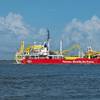MSC Ship Management (Hong Kong) Limited—a Hong Kong-based container ship company—has agreed to plead guilty to charges that it engaged in conspiracy, obstruction of justice, destruction of evidence, false statements and violated the Act to Prevent Pollution from Ships, the Department of Justice announced today. Per the terms of a plea agreement that must be approved by the court, MSC Ship Management will pay $10.5 million in penalties. This is the largest fine in which a single vessel has been charged with deliberate pollution and the largest criminal fine paid by a defendant in an environmental case in Massachusetts history.
According to the plea agreement, including a joint factual statement, MSC Ship Management will plead guilty to a criminal information which charges that a specially fitted steel pipe, referred to as the “magic pipe,” was used on the MSC Elena, a 30,971 ton container ship, to circumvent required ship pollution prevention equipment and discharge oil sludge and oil contaminated waste directly overboard. Upon the discovery of this bypass equipment during a U.S. Coast Guard inspection in Boston Harbor on May 16, 2005, senior company officials in Hong Kong directed crew members to lie to the Coast Guard. Additionally, senior ship engineers ordered that documents be destroyed and concealed.
“This is the largest fine involving deliberate pollution from a single ship in a long series of similar prosecutions that have been brought as part of a vessel pollution initiative,” said Sue Ellen Wooldridge, Assistant Attorney General for the Justice Department’s Environment and Natural Resources Division. “Deliberate vessel pollution is a serious and persistent problem which we will prosecute to the full extent of the law.”
“Residents of Massachusetts and particularly those along the Buzzards Bay coastline have experienced first-hand the devastation to the environment that can result from accidental oil spills. However, there was nothing accidental about this case,” said Michael Sullivan, U.S. Attorney for the District of Massachusetts. “The defendant knowingly violated anti-pollution laws, intentionally dumping oil-contaminated waste directly into the ocean—and even went so far as to manufacture a so-called ‘magic pipe’ to accomplish the crime. Our hope is that this substantial $10 million fine will send a strong message to those in the maritime community who would try to circumvent our Nation's anti-pollution laws.” MSC Ship Management discharged approximately 40 tons or approximately 10,640 gallons of sludge during a five-month period in 2004 through a three-piece bypass pipe manufactured on the ship. An even larger volume of oil-contaminated bilge waste was also discharged with a rubber hose and portable pump. The MSC Elena made regular voyages from ports in Europe across the Atlantic to ports in the United States, including Boston.
Under the terms of the plea agreement, MSC Ship Management has agreed to plead guilty to charges that it made false statements to the Coast Guard denying knowledge about the existence and use of the bypass equipment; obstructed justice by directing subordinates to lie to the Coast Guard; concealed evidence; and concealed oil pollution in a falsified Oil Record Book— a required log in which all overboard discharges must be recorded.
MSC Ship Management has also agreed to plead guilty to charges that in response to a Coast Guard inspection, senior ship engineers directed that an “alarm” printout from the ship’s computer and a log containing actual tank volumes be concealed in an effort to cover up the falsification of records. Coast Guard inspectors were presented with fictitious logs containing false entries claiming the use of the Oil Water Separator and omitting any reference to dumping overboard using the bypass equipment.
“The Coast Guard is committed to the protection of the marine environment in Massachusetts, in New England, and throughout the United States. To accomplish this goal, the Coast Guard ensures that vessel owners and operators comply with the law and are truthful with our inspectors,” said Rear Admiral David P. Pekoske, Commander, First Coast Guard District. “This defendant’s crimes, and especially management’s direct involvement, undermines our entire regulatory system for the protection of the environment. This successful prosecution and the severe penalties associated with it should send a message that intentional pollution and lying to the Coast Guard will not be tolerated.”
Additionally, under the terms of the plea agreement, MSC Ship Management will be on probation for five years, during which time it must operate under the terms of a government-approved Environmental Compliance Plan. The plan includes review by an independent auditor of any of MSC Ship Management’s 81 ships—including the MSC Elena—that trade in the United States, and a review of those audits by a court-appointed monitor.
If the plea agreement is approved by the court, MSC Ship Management will pay a $10 million a criminal fine, and an additional $500,000 to support community service projects. The projects will be administered by the National Fish & Wildlife Foundation to fund non-profit organizations that provide environmental education to seafarers visiting or sailing from Massachusetts ports, including how to report environmental crimes to the U.S. Coast Guard.
Engine room operations on-board large ocean-going vessels such as the MSC Elena generate large amounts of waste oil and oil contaminated bilge waste. International and U.S. law prohibit the discharge of waste containing more than 15 parts per million oil and without treatment by an Oil Water Separator and oil sensing equipment—a required pollution prevention device. The Act to Prevent Pollution from Ships also requires that all overboard discharges be recorded in an Oil Record Book, which is subject to inspection by the Coast Guard. The waste oil may be incinerated on board the ship or offloaded in port for proper disposal.
In two related prosecutions, the Chief Engineer of the MSC Elena, Mani Singh, was indicted in November and has agreed to plead guilty at a hearing scheduled for December 20, 2005. Aman Mahana, the ship’s Second Engineer, pleaded guilty on December 1, 2005. Sentencings for Singh and Mahana will take place early next year.
This investigation was conducted by the Northeast Regional Office of the U.S. Coast Guard Investigative Service, with assistance from the U.S. Coast Guard Sector Boston; U.S. Coast Guard First District Legal Office; U.S. Coast Guard Office of International and Maritime Law; U.S. Coast Guard Headquarters Office of Investigations and Analysis; and U.S. Coast Guard Office of Compliance. The case is being prosecuted by Assistant U.S. Attorney Jonathan F. Mitchell in the District of Massachusetts’ Economic Crimes Unit, Special Assistant U.S. Attorney Luke M. Reid of the U.S. Coast Guard, and Senior Trial Attorney Richard A. Udell and Trial Attorney Malinda R. Lawrence of the Justice Department’s Environmental Crimes Section.
Featured videos

Tracking Foreign Vessels Working in the U.S. Jones Act Market

Unlock Onboard Data Efficiencies

Inmarsat Enhances Service to Drive Digitalization
Subscribe for
Maritime Reporter E-News
Maritime Reporter E-News is the maritime industry's largest circulation and most authoritative ENews Service, delivered to your Email five times per week









